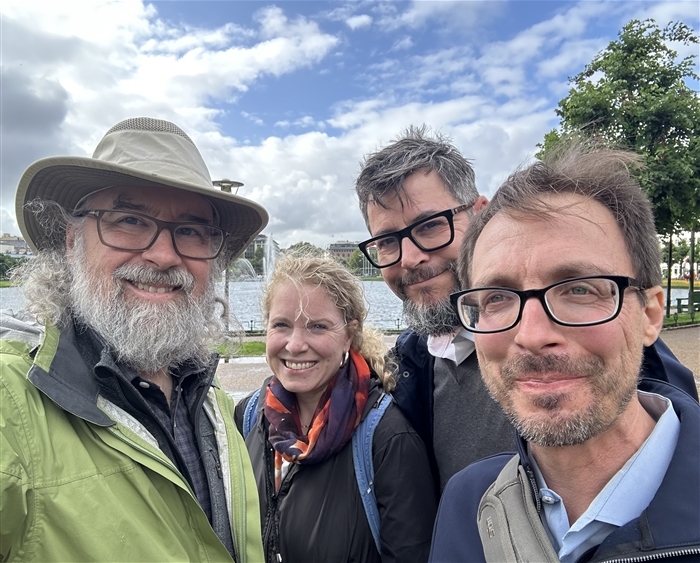HUMAN team deepens partnership with University of Bergen’s Center for Digital Narrative
 Professors Ben Zeller (from left), Rachel Whidden, Josh Corey, and Davis Schneiderman
Professors Ben Zeller (from left), Rachel Whidden, Josh Corey, and Davis Schneiderman
In early August, faculty leaders and administrators from Lake Forest College’s $1.2 million HUMAN grant from the Mellon Foundation traveled to the University of Bergen to collaborate with colleagues at the Center for Digital Narrative (CDN).
This visit marked another milestone in the College’s growing presence at the intersection of humanities, arts, and artificial intelligence.
The partnership builds on existing ties between Lake Forest and the CDN, through Scott Rettberg, director of CDN and the HUMAN grant’s external assessor, who has visited the College both individually and with a delegation of scholars and artists from CDN.
“Lake Forest’s collaboration with the University of Bergen exemplifies what a liberal arts college can contribute to global conversations on AI,” said Executive Director of the Krebs Center for the Humanities and HUMAN Principal Investigator Davis Schneiderman. “By combining artistic practice, humanistic critique, and technical fluency, we are helping to shape a future in which AI is understood not only as a controversial tool, but as part of the human story.”
‘More than Meets AI’ exhibition coming to Lake Forest
 One highlight of the August visit was planning for “More than Meets AI,” an art exhibition previously mounted at CDN that will travel to Lake Forest in spring 2026. The show will open across the College’s Sonnenschein and Durand Art Galleries, bringing to campus a set of works that probe the boundaries between artistic practice and artificial intelligence. HUMAN Steering Committee member and Chair of the Department of Art and Art History David Sanchez-Burr will play a lead role in mounting the exhibit.
One highlight of the August visit was planning for “More than Meets AI,” an art exhibition previously mounted at CDN that will travel to Lake Forest in spring 2026. The show will open across the College’s Sonnenschein and Durand Art Galleries, bringing to campus a set of works that probe the boundaries between artistic practice and artificial intelligence. HUMAN Steering Committee member and Chair of the Department of Art and Art History David Sanchez-Burr will play a lead role in mounting the exhibit.
Image used with permission.
HUMAN / AI seminar
The HUMAN team also participated in a day-long research seminar, HUMAN / AI: Humanities, Arts, and Artificial Intelligence, which brought together scholars from Lake Forest and Bergen.
The event began with remarks from Rettberg and Provost Tara Natarajan, who underscored the importance of international collaboration in shaping the future of humanistic inquiry into emerging technologies.
Lake Forest faculty presentations included:
- Davis Schneiderman, HUMAN Principal Investigator: The HUMAN Grant (+ Cybernetics and the Las Vegas Sphere
- Rachel Whidden, HUMAN Fellow, HUMAN Project Director, and Associate Professor of Communication: Framing Apologies in the Age of AI
- Josh Corey, HUMAN Fellow and Professor of English: The Lucy Parsons Project: Publishing an AI-Assisted Edition of a Little-Known Labor Leader’s Writings
- Ben Zeller, HUMAN Project Director and Professor of Religion: A New Religious Movement Studies Approach to AI

Professor Rachel Whidden (above) presents her findings to the CDN researchers.
The program also featured CDN researchers, alongside international keynote speakers Chris Salter (Zurich University of the Arts) and Warren Sack (UC Santa Cruz). Topics ranged from the role of literary theory in understanding generative AI to sound art installations, digital poetry, and new approaches to electronic literature. “The seminar brought together scholars in different fields, using different methodologies, and really showcased the creativity of interdisciplinary inquiry. We are all grappling with the advent of AI and its impact, each in our own way. We’re excited that Lake Forest College is on the cutting edge of this work,” said Zeller.
A growing presence in AI and the humanities
 The HUMAN initiative, supported by a Mellon Foundation grant, positions Lake Forest College as a national leader in exploring the ethical, cultural, and creative dimensions of artificial intelligence. Together with the College’s newly launched AI minor, HUMAN expands opportunities for students and faculty to engage deeply with technology across disciplines. HUMAN also partners with Sweet Water Foundation, Ragdale, and the Chicago History Museum, on projects that involve many Lake Forest College students.
The HUMAN initiative, supported by a Mellon Foundation grant, positions Lake Forest College as a national leader in exploring the ethical, cultural, and creative dimensions of artificial intelligence. Together with the College’s newly launched AI minor, HUMAN expands opportunities for students and faculty to engage deeply with technology across disciplines. HUMAN also partners with Sweet Water Foundation, Ragdale, and the Chicago History Museum, on projects that involve many Lake Forest College students.
In his external assessment of HUMAN, Rettberg praised the project as “very well-designed, extremely expansive, carefully organized and … an ambitious series of experiments that is delivering copious results.” He further noted, “I’ve not heard of such a thorough exploration of AI in the liberal arts education context taking place at any other institution.”

